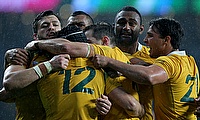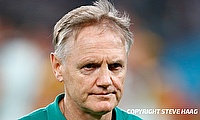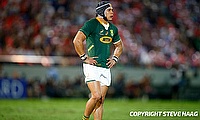Scott Higginbotham on why axing the ‘Giteau Law’ is the ‘way forward’ for the Wallabies
#image1#
To start their 2021 Rugby Championship campaign, Dave Rennie’s Australia lost 57-22 at the hands of the All Blacks.
Seven days earlier on the opening weekend of the Bledisloe Cup, it was the same old story as New Zealand won 33-25 despite a late resurgence by the Wallabies. As a result, the two defeats mean that the cup will stay with Ian Foster's side for a 19th consecutive year.
But since the most recent loss, the debate has opened up as to whether the Giteau Law should be scrapped. Introduced in 2015, the policy change was designed to allow some overseas-based players to be selected for the national team.
At the time, the practice was named after Matt Giteau as it was primarily a way to include the back in the 2015 Rugby World Cup squad, something that proved invaluable as the former Brumbies man knocked England out of the tournament that autumn.
In order for players to be selected whilst plying their trade abroad, they must have at least 60 Test caps, as well as a minimum of seven seasons playing in Super Rugby. At present, only two players can be selected underneath the law, with another two players who represent clubs outside of Australia also able to be selected regardless of caps.
Following recent form, which has included those defeats at the hands of the All Blacks and a tight series win over France, many believe that the Giteau Law should be changed. The Rugby Australia board are clearly in a debate of their own about the rule, whilst former players like Stirling Mortlock and David Campese have also voiced their opinions on the selection of overseas players.
At present, the only player in the squad who has been included under the Giteau Law is Quade Cooper, whilst Toulon’s Duncan Paia’aua (uncapped) and Tokyo Sungoliath’s Samu Kerevi (13 caps) are the players who ply their trade abroad but are allowed into the squad.
Having spent the final season of his career in the Top 14 playing for Bordeaux, former Wallaby back-row Scott Higginbotham, who won 32 caps for Australia, has come face to face with the likes of Will Skelton (La Rochelle), as well as Richie and Rory Arnold (both Toulouse), who are not allowed to represent their country under the current rules.
All of the aforementioned players have been operating at an extremely high level, Skelton, in particular, earning the plaudits of many and was asked plenty of questions surrounding his international future in the lead-up to La Rochelle’s Champions Cup final encounter with Toulouse at Twickenham back in May.
#image2#
Also in France is hooker Tolu Latu who moved to Stade Francais along with Sefa Naivalu following the conclusion of the 2019 Rugby World Cup. Add to this the likes of back-row Sean McMahon, Liam Gill and Tom English in Japan, as well as Curtis Rona, Ben Meehan and Taqele Naiyaravoro in the Gallagher Premiership, the pool of talent which Rennie could have at his disposal is clear for all to see.
Watching on from his home in Bordeaux, Higginbotham believes that Australian players should be made available for international selection regardless of where they play their club rugby.
“Rugby is an international game,” he stated. "It shouldn’t matter where you play to be able to play for your country, I feel. Even if you haven’t represented your country before or if you are playing top-level football, you are working your trade in whatever competition you choose, you should be able to play for the Wallabies.
“That is just how it should be and that is how the rest of the international team’s work apart from Australia and New Zealand. Australia might lose some players to international teams because of contracts and whatnot, and other guys have different reasons for what they play for, and a lot of guys don’t necessarily play for money, but you only have a certain amount of time to earn a decent amount of money.
“That’s where the carrot is in playing overseas, but I feel that if you are Australia eligible, capped or not, you should be able to be brought in and used in the Wallabies set-up.
“It is definitely the way forward if you want to be competitive and the Wallabies is your top-level in Australia, the top of rugby union and you need to be competitive to get the grassroots and everything picking up as well.”
Perhaps some of this year’s misfortune can be accredited to inexperience. The team’s fly-half, Noah Lolesio, is just 21, his half-back partner Tate McDermott just 22. This can be seen throughout the squad with Rennie still on the hunt for his perfect combinations for the 2023 Rugby World Cup in France.
Players who have thrived abroad have often been coaxed back to Australia in order to represent the Wallabies. Nic White left Exeter Chiefs, Matt Toomua left Leicester Tigers, as did Tatafu Polota-Nau prior to retiring earlier this year.
For Higginbotham, it is only the hope of playing in gold and green that is keeping them in the country but is steadfast in his belief that varied experiences abroad would be of a greater benefit to the national team.
“I think Australian rugby has a bit of a mindset that that younger, up and coming (players) is better,” Higginbotham said. “In Australian rugby, experience is overlooked a lot and I think it has been that way for a while.
“Especially since the 20-teens, they started to show more and more that experience was less valued, and I think the Wallabies have shown that and performed in that way. They haven't been able to get wins and then create that sort of culture within a team and that is one side of the frustration.
“Another side of the frustration is playing with a lot of guys that didn’t necessarily get much of a go in the Wallabies but were without a doubt the better player. They might have been such a good player at a really young age but ended up having to go overseas because one guy in their position was picked over them despite them being the better player. That is the frustration."
#image3#
In the years that have passed, players have even had stints abroad in between World Cup’s. Sekope Kepu and Adam Ashley-Cooper went to Bordeaux, Will Genia to Stade Francais, Bernard Foley to the Ricoh Black Rams and David Pocock to the Panasonic Wild Knights.
Some of these players had already re-signed with Australian Super Rugby sides or qualified to represent the Wallabies under the Giteau Law, but it highlights the opportunities available to players and their desire to experience other environments in their rugby careers.
“I suppose the only carrot for them at the moment is to play at the Wallabies,” Higginbotham said. “There is obviously a lot more money overseas and that is just the reality of it. I think if you look back at after the 2015 World Cup when Australia was at one of its strongest points, the majority of those players ended up playing overseas and were still playing great, top-level football through to the last World Cup.
“There are both sides to look at it for Australia and it is really hard to consider giving that up because I think a lot of players will end up playing overseas because they only get one career, and it is a great opportunity to give yourself a head start in life. If they want to be competitive, which I am sure they do, then that (getting rid of the Giteau Law) is the option.
“At the end of the day, when you are playing international rugby, you are playing guys in the Premiership, and in the Top 14, so you need that experience of playing overseas players. For me, bringing in a guy like Quade Cooper, as well as having James Slipper, guys who have great experience in the game, is doing that.
“That experience has been overlooked in the past and that maturity and experience needs to be brought back in for game situations as well as off-field situations.”








